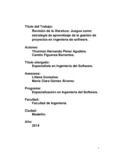Mostrar el registro sencillo del ítem
Revisión de la literatura : juegos como estrategia de aprendizaje de la gestión de proyectos en ingeniería de software
| dc.contributor.advisor | González Palacio, Liliana | |
| dc.contributor.advisor | Gómez Álvarez, María Clara | |
| dc.contributor.author | Pérez Agudelo, Yhorman Hernando | |
| dc.contributor.author | Figueroa Barrantes, Camilo Andrés | |
| dc.coverage.spatial | Lat: 06 15 00 N degrees minutes Lat: 6.2500 decimal degreesLong: 075 36 00 W degrees minutes Long: -75.6000 decimal degrees | |
| dc.date.accessioned | 2022-04-28T16:32:46Z | |
| dc.date.available | 2022-04-28T16:32:46Z | |
| dc.date.issued | 2014 | |
| dc.identifier.other | CD-ROM 7655 2014 | |
| dc.identifier.uri | http://hdl.handle.net/11407/6905 | |
| dc.description | El aprendizaje en Ingeniería de Software ha sido abordado desde las instituciones de educación superior -IES- con métodos convencionales que ofrecen niveles bajos de integración entre la teoría y la práctica necesarias para abordar las competencias y habilidades requeridas. Así mismo, las deficiencias en la forma de enseñar la gestión de proyectos inciden en dificultades para mantener la motivación y la atención. El aprendizaje basado en juegos es una alternativa de formación ya que permite al estudiante: i) entender y saber aplicar las teorías, modelos y técnicas estándar para analizar sistemáticamente y desarrollar artefactos de software de calidad, ii) tener conocimientos de gestión de proyectos y ser capaz de conciliar los objetivos de diseño en conflicto y considerar cuestiones de organización, iii) desarrollar habilidades de trabajo en equipo, liderazgo, negociación y resolución de conflictos. Esta revisión de la literatura busca conocer el estado del aprendizaje basado en juegos educativos para el tema de la gestión de proyectos software. Para tal efecto se tienen en cuenta criterios de evaluación en los ámbitos del proceso de aprendizaje, los factores motivacionales, la experiencia de usuario y los contenidos educacionales de la gestión de proyectos. Finalmente se propone la dinámica de un juego y un conjunto de características fundamentales que deben incluirse para lograr mejores resultados al usar lúdicas en procesos de enseñanza/aprendizaje. El juego planteado se sustentan en la simulación de entornos y actividades relevantes en la gestión de proyectos de software que permitan el aprendizaje y reforzamiento de competencias relacionadas, soportado por una continua retroalimentación bajo atributos que posibiliten el nivel de diversión, la adaptación y selección de la complejidad y/o temáticas a enfrentar, la interacción social, así como mecanismos que ofrezcan continuos desafíos, satisfacción y confianza basados en el esfuerzo. | spa |
| dc.description | Learning in Software Engineering has been approached from the institutions of higher education -IES- with conventional methods that offer low levels of integration between theory and practice necessary to address the competencies and skills required. Likewise, deficiencies in the way of teaching project management affect difficulty maintaining motivation and attention. The game-based learning is an alternative training because it allows the student: i) understand and be able to apply the theories, models and standard techniques to systematically analyze and develop quality software artifacts, ii) have knowledge of project management and be able to reconcile the conflicting design objectives and consider organizational matters, iii) develop skills in teamwork, leadership, negotiation and conflict resolution. This literature review seeks to know the status of educational games based learning to the subject of project management software. To this effect is taken into account evaluation criteria in the areas of learning process, motivational factors, user experience and educational content of project management. Finally is proposed the dynamics of a game and a set of core features that should be included in the game to achieve better results when using leisure in teaching / learning is proposed. The game proposed are based on simulation environments and relevant activities in the project management software that allows the learning and reinforcement of related skills, supported by continuous feedback on attributes that enable the level of fun, adaptation and selection complexity and / or issues to face, social interaction, and mechanisms that provide continuous challenges, satisfaction and confidence based on effort. | eng |
| dc.format.extent | p. 1-21 | |
| dc.format.medium | Electrónico | spa |
| dc.format.mimetype | application/pdf | |
| dc.language.iso | spa | |
| dc.rights.uri | http://creativecommons.org/licenses/by-nc/4.0 | * |
| dc.subject | Juegos educativos | spa |
| dc.subject | Aprendizaje basado en juegos | spa |
| dc.subject | Juegos y aprendizaje | spa |
| dc.subject | Juegos serios | spa |
| dc.subject | Ingeniería de software | spa |
| dc.subject | Simulación | spa |
| dc.subject | Gestión de proyectos en la ingeniería de software | spa |
| dc.subject | Educational games | eng |
| dc.subject | Games-based learning | eng |
| dc.subject | Games and learning | eng |
| dc.subject | Serious games | eng |
| dc.subject | Software engineering | eng |
| dc.subject | Simulations | eng |
| dc.subject | Project management on software engineering | eng |
| dc.title | Revisión de la literatura : juegos como estrategia de aprendizaje de la gestión de proyectos en ingeniería de software | spa |
| dc.type | info:eu-repo/semantics/bachelorThesis | |
| dc.type | info:eu-repo/semantics/article | |
| dc.rights.accessrights | info:eurepo/semantics/openAccess | |
| dc.publisher.program | Especialización en Ingeniería del Software | spa |
| dc.subject.lemb | Ingeniería de software | spa |
| dc.subject.lemb | Desarrollo de programas para computador | spa |
| dc.subject.lemb | Juegos educativos | spa |
| dc.subject.lemb | Juegos de simulación en educación | spa |
| dc.subject.lemb | Administración de proyectos | spa |
| dc.subject.lemb | Revisión de la literatura | spa |
| dc.relation.citationstartpage | 1 | |
| dc.relation.citationendpage | 21 | |
| dc.audience | Comunidad Universidad de Medellín | spa |
| dc.publisher.faculty | Facultad de Ingenierías | spa |
| dc.publisher.place | Medellín | spa |
| dc.relation.references | Calderón, A., & Ruiz, M. (2013, October). ProDec: a Serious Game for Software Project Management Training. In ICSEA 2013, The Eighth International Conference on Software Engineering Advances (pp. 565-570). | spa |
| dc.relation.references | Cano, J. L., & Sáenz, M. J. (2003). Project management simulation laboratory: experimental learning and knowledge acquisition. Production Planning & Control, 14(2), 166-173. | spa |
| dc.relation.references | Carrington, D., Baker, A., & van der Hoek, A. (2005, October). It's All in the Game: Teaching Software Process Concepts. In Frontiers in Education, 2005. FIE'05. Proceedings 35th Annual Conference (pp. F4G-F4G). IEEE. | spa |
| dc.relation.references | Caulfield, C., Xia, J., Veal, D., & Maj, S. P. (2011). A Systematic Survey of Games Used for Software Engineering Education. Modern Applied Science, 5(6). | spa |
| dc.relation.references | Chua, A. Y. K., & Balkunje, R. S. (2012). An Exploratory Study of Game-based M-learning for Software Project Management. J. UCS, 18(14), 1933-1949. | spa |
| dc.relation.references | Connolly, T. M., Stansfield, M., & Hainey, T. (2008). Using Games-Based Learning to Teach Software Engineering. In Web Information Systems and Technologies (pp. 304-313). Springer Berlin Heidelberg. | spa |
| dc.relation.references | Connolly, T. M., Stansfield, M., & Hainey, T. (2009). Towards the development of a games-based learning evaluation framework. Games-based learning advancements for multi-sensory human computer interfaces, 251-273. | spa |
| dc.relation.references | Dantas, A. R., de Oliveira Barros, M., & Werner, C. M. L. (2004, June). A Simulation-Based Game for Project Management Experiential Learning. In SEKE (Vol. 19, p. 24). | spa |
| dc.relation.references | Davidovitch, L., Parush, A., & Shtub, A. (2006). Simulation‐based Learning in Engineering Education: Performance and Transfer in Learning Project Management. Journal of Engineering Education, 95(4), 289-299. | spa |
| dc.relation.references | Dos Santos, R. P., dos Santos, P. S. M., Werner, C. M. L., & Travassos, G. H. (2008). Utilizando Experimentação para Apoiar a Pesquisa em Educação em Engenharia de Software no Brasil. Fórum de Educação em Engenharia de Software, 55. | spa |
| dc.relation.references | Gertrudix Barrio, M., & Gertrudix Barrio, F. (2013). Aprender jugando. Mundos inmersivos abiertos como espacios de aprendizaje de los y las jóvenes. | spa |
| dc.relation.references | Hainey, T., Connolly, T. M., Stansfield, M., Boyle, E. (2011). Evaluation of a game to teach requirements collection and analysis in software engineering at tertiary education level. | spa |
| dc.relation.references | Navarro, E. O., Baker, A., & Van Der Hoek, A. (2004, January). Teaching software engineering using simulation games. In ICSIE‘04: Proceedings of the 2004 International Conference on Simulation in Education. | spa |
| dc.relation.references | Mandl-Striegnitz, P. (2001). How to successfully use software project simulation for educating software project managers. In Frontiers in Education Conference, 2001. 31st Annual (Vol. 1, pp. T2D-19). IEEE. | spa |
| dc.relation.references | Rusu, A., Russell, R., & Cocco, R. (2011, July). Simulating the software engineering interview process using a decision-based serious computer game. In Computer Games (CGAMES), 2011 16th International Conference on (pp. 235-239). IEEE. | spa |
| dc.relation.references | Savi, R., von Wangenheim, C. G., & Borgatto, A. F. (2011, September). A Model for the Evaluation of Educational Games for Teaching Software Engineering. In Software Engineering (SBES), 2011 25th Brazilian Symposium on (pp. 194-203). IEEE. | spa |
| dc.relation.references | Savi, R., von Wangenheim, C. G., Ulbricht, V., & Vanzin, T. Proposta de um Modelo de Avaliação de Jogos Educacionais. | spa |
| dc.relation.references | Stellman, A., & Greene, J. (2005). Applied software project management. O'Reilly Media. | spa |
| dc.relation.references | Susi, T., Johannesson, M., & Backlund, P. (2007). Serious games: An overview. | spa |
| dc.relation.references | Taran, G. (2007, July). Using games in software engineering education to teach risk management. In Software Engineering Education & Training, 2007. CSEET'07. 20th Conference on (pp. 211-220). IEEE. | spa |
| dc.relation.references | von Wangenheim, C. G., Savi, R., & Borgatto, A. F. (2013). SCRUMIA—An educational game for teaching SCRUM in computing courses. Journal of Systems and Software, 86(10), 2675-2687. | spa |
| dc.relation.references | von Wangenheim, C. G., Savi, R., & Borgatto, A. F. (2012). DELIVER!–An educational game for teaching Earned Value Management in computing courses. Information and Software Technology, 54(3), 286-298. | spa |
| dc.relation.references | Xia, J. C., Caulfield, C., Baccarini, D., & Yeo, S. (2012). Simsoft: A game for teaching project risk management. | spa |
| dc.relation.references | Yusoff, A., Crowder, R., Gilbert, L., & Wills, G. (2009, July). A conceptual framework for serious games. In Advanced Learning Technologies, 2009. ICALT 2009. Ninth IEEE International Conference on (pp. 21-23). IEEE. | spa |
| dc.relation.references | Zapata Jaramillo, C. M., & Duarte Herrera, M. I. (2008). Consistency game: a didactic strategy for software engineering. Revista Técnica de la Facultad de Ingeniería Universidad de Zulia, 31(1), 3-12. | spa |
| dc.rights.creativecommons | Attribution-NonCommercial-ShareAlike 4.0 International | * |
| dc.type.version | info:eu-repo/semantics/publishedVersion | |
| dc.type.version | info:eu-repo/semantics/acceptedVersion | |
| dc.type.local | Trabajo de grado - Especialización | spa |
| dc.description.degreename | Especialista en Ingeniería del Software | spa |
| dc.description.degreelevel | Especialización | spa |
| dc.publisher.grantor | Universidad de Medellín | spa |
Ficheros en el ítem
Este ítem aparece en la(s) siguiente(s) colección(ones)
-
Trabajos de grado [699]



